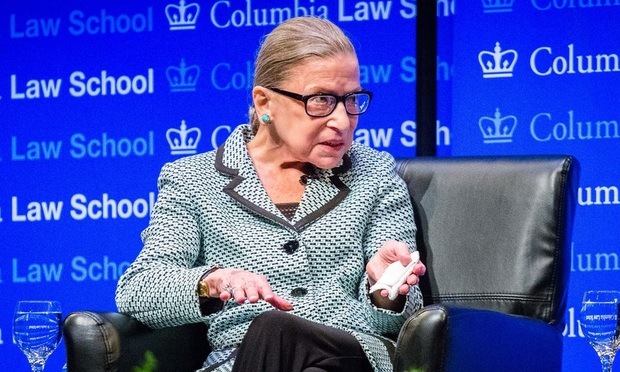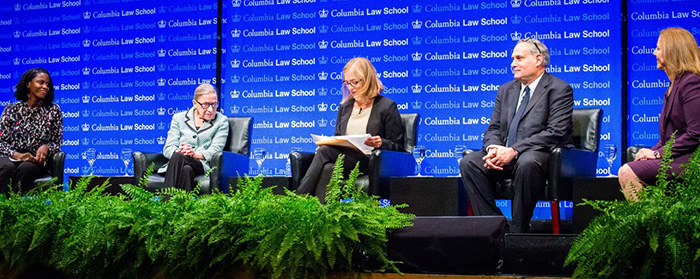Ginsburg Discusses Litigation as Driver of Policy Change in Columbia Law Panel
In the decades since U.S. Supreme Court Justice Ruth Bader Ginsburg was a litigator fighting for equal rights for women, the field of interested parties has grown on both sides of the political spectrum, which often means a larger stack of amicus briefs for the high court to sift through.
September 21, 2018 at 07:44 PM
6 minute read
The original version of this story was published on New York Law Journal
 Supreme Court Justice Ruth Bader Ginsburg speaks at Columbia Law School which held a special event to honor the 25th anniversary of her investiture. (Photo by David Handschuh/ALM)
Supreme Court Justice Ruth Bader Ginsburg speaks at Columbia Law School which held a special event to honor the 25th anniversary of her investiture. (Photo by David Handschuh/ALM)
In the decades since U.S. Supreme Court Justice Ruth Bader Ginsburg was a litigator fighting for equal rights for women, the field of interested parties has grown on both sides of the political spectrum, which often means a larger stack of amicus briefs for the high court to sift through.
But speaking on Friday at a panel discussion at Columbia Law School on how impact litigation can affect public policy change, Ginsburg said the proliferation of interest groups involved with litigation has been “worrisome” in some instances, citing the high court's split ruling this year in a case to strike down a California law requiring “crisis pregnancy centers,” which do not provide abortions and oppose them, to post notices that reproductive services are available elsewhere.
“That was attacked on free speech grounds compelling people to speak,” said Ginsburg, who was in the four-justice minority voting to uphold the California law.
Ginsburg took part in the panel discussion, which attracted more than 1,000 attendees, alongside Lee Gelernt, deputy director of the American Civil Liberties Union Immigrants' Rights Project; Olatunde Johnson and Gillian Metzger, both professors at Columbia Law; and Nancy Northup, president and CEO of the Center for Reproductive Rights.
Aside from the explosion of interest groups—which Northup said has made impact litigation resemble a game of three-dimensional chess—in impact litigation today, the panelists also hit on a wide range of topics, including the role of media attention in bringing impact litigation; Gelernt said that the advent of social media has created a dizzying array of sources of information, which has made it increasingly difficult to control the narrative surrounding their cases.
Additionally, Gelernt said, there's a sense these days among some lawyers that some cases aren't worth taking if they don't trigger a media blitz or go viral.
“I do feel that everyone wants to bring a case now that will blow up the social media world, and that's a dangerous thing I think I see for young lawyers starting out now in public interest law,” Gelernt said.
But while Ginsburg didn't have to worry about Twitter in the 1970s, she said that wrangling the media and educating the public was a persistent challenge for litigators in those days—in her case, she said, it was dispelling the notion that women somehow had any easier go of it because they weren't expected to do things like serve on juries.
Like most recent public appearances by Ginsburg and her colleagues on the court, the justice steered away from saying anything that might be construed as controversial.
When asked by Columbia Law Dean Gillian Lester what she sees on the horizon in public policy litigation, Ginsburg declined to comment.
Ginsburg's fellow panelists, though, said they foresee economic justice as an issue that will be a growing issue for impact litigation in the years to come.
Johnson said that, while it may not be clear at this point what role the courts can play in the realm of economic justice, some issues that may come to the fore are fair wages, indigent defense and bail reform, as well as the potential for proposed constitutional provisions.
 Justice Ginsburg was joined on stage by (from left) Columbia Law professors Olatunde Johnson and Gillian Metzger; Lee Gelernt, deputy director of the ACLU Immigrants' Rights Project; and Nancy Northup, president and CEO of the Center for Reproductive Rights. (Photo by David Handschuh/ALM)
Justice Ginsburg was joined on stage by (from left) Columbia Law professors Olatunde Johnson and Gillian Metzger; Lee Gelernt, deputy director of the ACLU Immigrants' Rights Project; and Nancy Northup, president and CEO of the Center for Reproductive Rights. (Photo by David Handschuh/ALM)Ginsburg's appearance at Columbia Law comes as the U.S. Senate continues confirmation hearings for the embattled D.C. Circuit Judge Brett Kavanaugh, who President Donald Trump has nominated to replace the retiring Justice Anthony Kennedy.
Ginsburg has spoken out about the evolution of the confirmation process into a “highly partisan affair.”
When asked by Lester about her views on the process, Ginsburg said that, with regard to her own confirmation process a quarter century ago, she wouldn't provide a preview of how we should decide because fellow justices would “no doubt” move to recuse her from cases.
“For me to give an off-the-cuff answer, that would be improper,” Ginsburg said.
While the impact of litigation on policy change was the theme of the panel, some attendees admitted that they were there to share the air with a justice who has emerged in recent years as a cultural icon for younger generations.
“I could hear her talk about anything, pretty much,” said Aryeh Mellman, a 2L at Columbia Law.
Regina Chong, an LL.M. at Columbia Law, also said that Ginsburg's celebrity was a draw, but said the topic was especially prescient now as Ginsburg faces the prospect of having a new colleague on the court that could solidify a conservative majority that many observers view as a threat to abortion rights.
“We want to hear what she has to say about how that could change,” Chong said.
Thomas White, a Washington, D.C., corporate lawyer and 1978 graduate of Columbia Law who took constitutional law and civil procedure classes from Ginsburg during his time in school, said he attended with the hope that she might say on what could happen with a new conservative majority on the court and how it may affect the accomplishments for social justice that have occurred through Ginsburg's career.
“Frankly I don't think it's going to be positive,” White said.
Read More:
Mandatory Bar Dues Face New Questions After Justices Curtail Union Fees
Trump Watch: How Kavanaugh Avoided the T-Word | Papadopoulos Sentence
RBG Action Figure Launched Through Copious Crowdfunding
This content has been archived. It is available through our partners, LexisNexis® and Bloomberg Law.
To view this content, please continue to their sites.
Not a Lexis Subscriber?
Subscribe Now
Not a Bloomberg Law Subscriber?
Subscribe Now
NOT FOR REPRINT
© 2025 ALM Global, LLC, All Rights Reserved. Request academic re-use from www.copyright.com. All other uses, submit a request to [email protected]. For more information visit Asset & Logo Licensing.
You Might Like
View All
US Judge Cannon Blocks DOJ From Releasing Final Report in Trump Documents Probe
3 minute read
Private Equity Giant KKR Refiles SDNY Countersuit in DOJ Premerger Filing Row
3 minute read
Three Akin Sports Lawyers Jump to Employment Firm Littler Mendelson
Trending Stories
- 1Goodwin Procter Relocates to Renewable-Powered Office in San Francisco’s Financial District
- 2'Didn't Notice Patient Wasn't Breathing': $13.7M Verdict Against Anesthesiologists
- 3'Astronomical' Interest Rates: $1B Settlement to Resolve Allegations of 'Predatory' Lending Cancels $534M in Small-Business Debts
- 4Senator Plans to Reintroduce Bill to Split 9th Circuit
- 5Law Firms Converge to Defend HIPAA Regulation
Who Got The Work
J. Brugh Lower of Gibbons has entered an appearance for industrial equipment supplier Devco Corporation in a pending trademark infringement lawsuit. The suit, accusing the defendant of selling knock-off Graco products, was filed Dec. 18 in New Jersey District Court by Rivkin Radler on behalf of Graco Inc. and Graco Minnesota. The case, assigned to U.S. District Judge Zahid N. Quraishi, is 3:24-cv-11294, Graco Inc. et al v. Devco Corporation.
Who Got The Work
Rebecca Maller-Stein and Kent A. Yalowitz of Arnold & Porter Kaye Scholer have entered their appearances for Hanaco Venture Capital and its executives, Lior Prosor and David Frankel, in a pending securities lawsuit. The action, filed on Dec. 24 in New York Southern District Court by Zell, Aron & Co. on behalf of Goldeneye Advisors, accuses the defendants of negligently and fraudulently managing the plaintiff's $1 million investment. The case, assigned to U.S. District Judge Vernon S. Broderick, is 1:24-cv-09918, Goldeneye Advisors, LLC v. Hanaco Venture Capital, Ltd. et al.
Who Got The Work
Attorneys from A&O Shearman has stepped in as defense counsel for Toronto-Dominion Bank and other defendants in a pending securities class action. The suit, filed Dec. 11 in New York Southern District Court by Bleichmar Fonti & Auld, accuses the defendants of concealing the bank's 'pervasive' deficiencies in regards to its compliance with the Bank Secrecy Act and the quality of its anti-money laundering controls. The case, assigned to U.S. District Judge Arun Subramanian, is 1:24-cv-09445, Gonzalez v. The Toronto-Dominion Bank et al.
Who Got The Work
Crown Castle International, a Pennsylvania company providing shared communications infrastructure, has turned to Luke D. Wolf of Gordon Rees Scully Mansukhani to fend off a pending breach-of-contract lawsuit. The court action, filed Nov. 25 in Michigan Eastern District Court by Hooper Hathaway PC on behalf of The Town Residences LLC, accuses Crown Castle of failing to transfer approximately $30,000 in utility payments from T-Mobile in breach of a roof-top lease and assignment agreement. The case, assigned to U.S. District Judge Susan K. Declercq, is 2:24-cv-13131, The Town Residences LLC v. T-Mobile US, Inc. et al.
Who Got The Work
Wilfred P. Coronato and Daniel M. Schwartz of McCarter & English have stepped in as defense counsel to Electrolux Home Products Inc. in a pending product liability lawsuit. The court action, filed Nov. 26 in New York Eastern District Court by Poulos Lopiccolo PC and Nagel Rice LLP on behalf of David Stern, alleges that the defendant's refrigerators’ drawers and shelving repeatedly break and fall apart within months after purchase. The case, assigned to U.S. District Judge Joan M. Azrack, is 2:24-cv-08204, Stern v. Electrolux Home Products, Inc.











